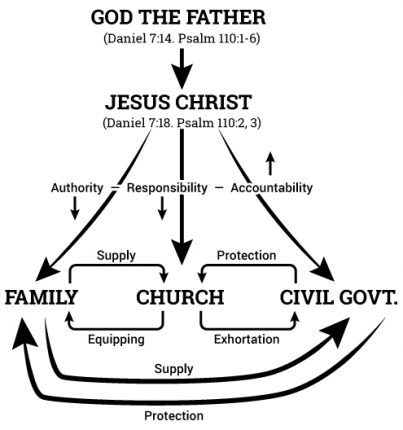Several weeks ago we were right in the middle of investigating the diagram that depicts how the Kingdom of God grows, which we call “The Ship of the Kingdom.” I suddenly felt a nudge (I believe from God) to change directions, so for the past three weeks I have temporarily interrupted our discussion of the Ship. I have left its emphasis on God’s law in His Kingdom through the family, church and civil government, and, instead sharpened the other edge of the Sword of the Word of God—God’s limitless grace poured out at the cross!
that depicts how the Kingdom of God grows, which we call “The Ship of the Kingdom.” I suddenly felt a nudge (I believe from God) to change directions, so for the past three weeks I have temporarily interrupted our discussion of the Ship. I have left its emphasis on God’s law in His Kingdom through the family, church and civil government, and, instead sharpened the other edge of the Sword of the Word of God—God’s limitless grace poured out at the cross!
Martin Luther taught that both of these emphases—God’s Law and God’s Grace, which are distinct opposites—are equally crucial in presenting the complete Word of God. God’s Law, found in both Old and New Testaments, tells me what I must do; God’s grace tells me what God did because I always fail when I try to do! God’s Law and God’s Grace must both be alive and functioning together. Only then can we experience THE TRUTH OF GOD that sets us free (John 1:17; 8:32),
It is only by the Law of God that we learn of God extending His rule through the family, church and civil government. Without God’s Law, we have no vision of how we will rule (Romans 8:4), but without God’s grace, trying to “rule” by God’s law will kill both those exercising it and those suffering under it (Romans 7:11)!
On this blog, “The Two Edges of the Sword,” we do our best to emphasize both edges equally—”the law edge” (kingdom) and “the grace edge” (gospel). Both are equally crucial in the family of God, like delightful, precious, fraternal twins with opposite personalities!
So, today we return to our Ship of the Kingdom. Although there are other organizations and associations God uses to extend His rule over the earth, He has biblically ordained but three of them—the family (Genesis 2:18, 24), the church (after the Day of Pentecost – Acts 2:42-47), and the civil government (Genesis 9:5-7). These three are absolutely essential and form the basis for ultimately everything to be brought into God’s Kingdom.
 We have already discussed the vertical lines in the diagram, representing the delegation of the Kingdom, and the authority, responsibility and accountability that characterizes that delegation. I want to now look at the horizontal lines, representing the relationships these three Kingdom-extending institutions have with each other.
We have already discussed the vertical lines in the diagram, representing the delegation of the Kingdom, and the authority, responsibility and accountability that characterizes that delegation. I want to now look at the horizontal lines, representing the relationships these three Kingdom-extending institutions have with each other.
Notice that none of the institutions have authority over any of the others; they each are fully independent, directly accountable to Jesus Christ alone.
Family – “How does it relate to…?”
The Church – The family is the basic institution upon which the church relies for its members. It is the source of supply from which the church draws them, who, hopefully, have been educated and biblically trained to submit to authority and follow legitimate leadership. Parents who neglect this foremost task mightily hinder the church in its job of equipping the church for its mission of kingdom-extending.
The Civil Government – Similarly, the family is the source of supply for the civil government, providing young people who grow up understanding the importance of this institution.
Church – “How does it relate to…?”
The Family – Surprisingly, the biblical model for church is a participatory one, rather than a spectating one. All members come to church gatherings knowing their input at the meetings is wanted and important (1 Corinthians 14:26). The church’s mission to the family is primarily equipping it to be a weapon in God’s hand (Ephesians 4:11-13) by carefully discussing both edges of the sword of the Word of God and how to apply that distinction to all of life, i.e., child training.
The Civil Government – Since all three institutions are directly under God’s complete authority, the corporate church cannot change civil government directly
.However it can speak prophetically to it, pointing out its sinful, unbiblical actions and exhorting it to change. Likewise, the church is fully independent of state control as to message and meetings. Also, It must renounce its disastrous practice of the last 100 years of retreating from involvement politically in the public square by teaching its members “Politics is a dirty business, and Christians don’t get involved.” We must join the public conversation, always presenting God’s biblical view of civil government’s role in the life of the nation.
Civil Government – How does it relate to…?.
The Family – Biblically, the civil government has two, and only two, functions in society—to protect its law-keeping citizens, and to punish its law-breaking citizens. All other functions today’s monolithic government performs are to be performed by the free market, according to the Bible. This protect/punish activity is paid for as a universally identical head tax supplied to the civil government by each citizen.
The Church – The church is free from any governmental control as it provides the church protection/punishment security in order for it to do its job of equipping the saints to extend Jesus’ rule over the earth.
As we approach this pivotal, crucial election in November, it is appropriate that we examine the biblical view of the civil government institution in more detail. Next week.
